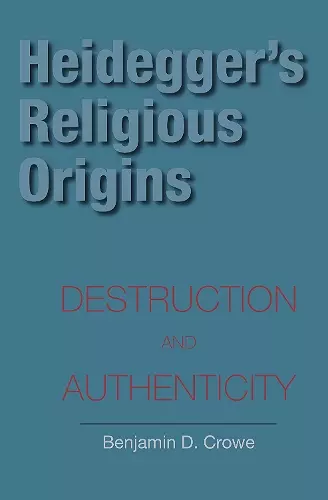Heidegger's Religious Origins
Destruction and Authenticity
Format:Paperback
Publisher:Indiana University Press
Published:21st May '06
Currently unavailable, and unfortunately no date known when it will be back

Sheds new light on Heidegger's early theological development
Explores the meaning and relevance of Heidegger's early theological development, especially his intellectual ties with Martin Luther. This work reveals Heidegger wrestling and coming to grips with his religious upbringing, his theological education, and his religious convictions.
In Heidegger's Religious Origins, Benjamin D. Crowe explores the meaning and relevance of Heidegger's early theological development, especially his intellectual ties with Martin Luther. Devoting particular attention to Heidegger's philosophy of religion in the turbulent aftermath of World War I, Crowe shows Heidegger tightening his focus and searching his philosophical practice for ideas on how one cultivates an "authentic" life beyond the "destruction" of Europe. This penetrating work reveals Heidegger wrestling and coming to grips with his religious upbringing, his theological education, and his religious convictions. While developing Heidegger's notion of destruction up to the publication of Being and Time, Crowe advances a new way to think about the relationship between destruction and authenticity that confirms the continuing importance of Heidegger's early theological training.
. . . Crowe contributes to the literature on Heidegger's connection with Christianity, especially with regard to Heidegger's early theological training and convictions. . . . Clearly written and thorough in its exegesis of early Heidegger. . .
* Religious Studies Review *. . . A fine book that sheds new light on the indebtedness of Heidegger to theology —i.e. to Protestant theology rather than to his own Catholic background.
* International Review of Biblical StudiISBN: 9780253218292
Dimensions: unknown
Weight: unknown
320 pages